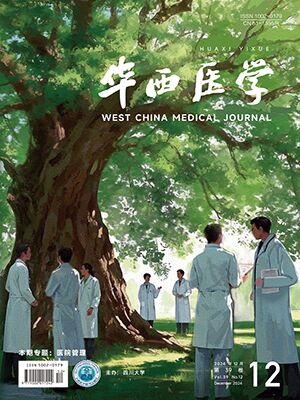摘要:目的: 探讨臂丛神经磁共振成像的技术方法及其可行性。 方法 :对15例正常志愿者行双侧臂丛神经成像:包括常规快速自旋回波序列T1加权(T1W/TSE)、快速自旋回波序列T2加权(T2W/TSE)、快速自旋回波序列T2加权加SPIR脂肪抑制(T2W/SPIR)冠状位扫描以及弥散加权背景抑制成像序列(DWIBS)轴位扫描。 结果 :T1W/TSE、T2W/TSE、及T2W/SPIR对臂丛节后神经同层显示率分别为533%、567%和833%;DWIBS MIP重建图像对臂丛神经的全貌显示较为完整、清晰、直观;T1W/TSE、T2W/TSE、T2W/SPIR及DWIBS MIP重建图像的对比噪声比分别为109±09、107±13、185±68和299±133,T2W/SPIR序列和DWIBS MIP重建图像的对比噪声比明显高于T1W/TSE和T2W/TSE序列。 结论 :T2W/SPIR序列对臂丛神经的同层显示率及图像的对比噪声比明显高于常规T1W/TSE、T2W/TSE序列, DWIBS MIP重建图像能够显示臂丛神经的全貌,两者为臂丛神经成像较为有效的技术方法,对于臂丛神经病变的诊断即具有十分重要的意义。
Abstract: Objective: To determine the optimal sequences of brachial plexus with MRI. Methods : Fifteen volunteers were underwent MRI on 15T scanner, the Sequences of T1W/TSE/COR, T2W/TSE/COR, T2W/SPIR/COR and Diffusionweighted imaging with background body signal suppression were performed. Results : The display rates of brachial plexus postganglionic segment nerve showing at the same slice were 533%, 567% and 833% on T1W/TSE/COR, T2W/TSE/COR, T2W/SPIR/COR. Brachial plexus on DWIBS MIP were clear and complete. Contrastnoise ratio of four sequences was 109±09, 107±13, 185±68 and 299±133,respectively. Contrastnoise ratio of T2W/SPIR/COR and DWIBS MIP was significantly higher than that of the other two sequences. Conclusion : Display rate of brachial plexus and contrastnoise ratio of images on T2W/SPIR/COR were higher than those of routine sequences. Image of DWIBS MIP can show the outline of brachial plexus clearly. The two sequences were reliable and effetive techoniquic in diagnosis of brachial plexus lesion.
Citation: LEI Xiaoyan,WANG Yang min,ZHANg Xin,et al.. Evaluation of Brachial Plexus with MRI. West China Medical Journal, 2009, 24(10): 2560-. doi: Copy
Copyright © the editorial department of West China Medical Journal of West China Medical Publisher. All rights reserved




